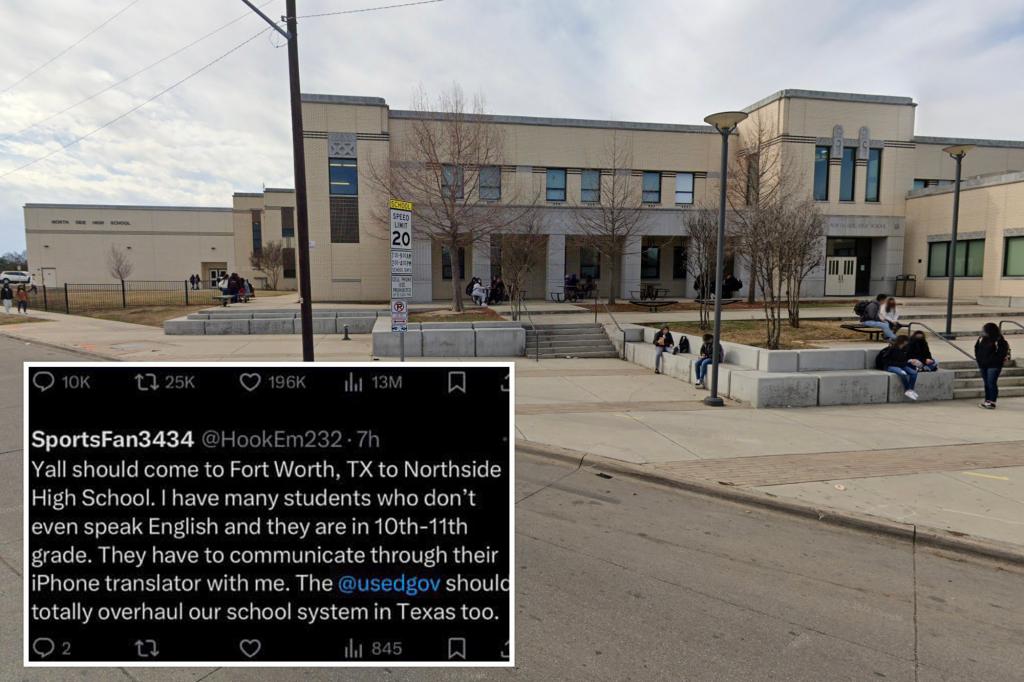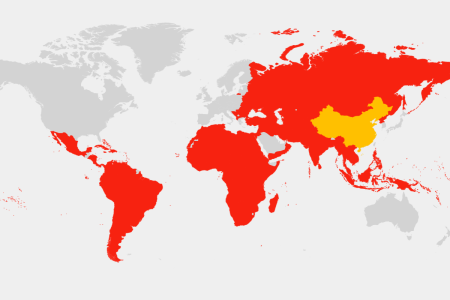The Fort Worth Independent School District (FWISD) found itself embroiled in controversy after a substitute teacher’s xenophobic social media post ignited a firestorm of criticism and raised concerns about the treatment of immigrant students. The incident, which unfolded in the context of heightened national debate surrounding immigration, underscores the challenges faced by diverse school communities navigating complex social and political landscapes.
The controversy erupted when the substitute teacher, identified by the X username @Hookem232, responded to an Immigration and Customs Enforcement (ICE) post about recent arrests. The teacher urged ICE agents to raid Northside High School in Fort Worth, citing the presence of students who “don’t even speak English” and rely on translation apps to communicate. This inflammatory rhetoric, targeting students learning English as a second language, quickly drew condemnation from district officials and community members. The teacher’s comments not only exposed a blatant disregard for the well-being of these students but also betrayed a profound misunderstanding of the district’s demographics, where two-thirds of the student population is Hispanic and over one-third are English language learners.
The FWISD acted swiftly to address the fallout from the teacher’s post. School Board President Roxanne Martinez issued a reassuring statement to parents, emphasizing the district’s commitment to resolving the situation promptly and ensuring the safety of all students. Interim Superintendent Karen Molinar echoed this sentiment, pledging support for all families within the district. While the teacher’s identity was withheld, the FWISD confirmed that the individual would not be allowed to teach pending a thorough investigation into the matter. This decisive action demonstrated the district’s commitment to accountability and its determination to create a welcoming and inclusive environment for all students, regardless of their language background.
The incident unfolded against the backdrop of shifting national immigration policies, including a directive from then-President Trump permitting ICE operations in “sensitive areas” such as schools and churches. Coupled with ongoing debates about border security and the influx of migrants, the teacher’s post tapped into a climate of heightened anxiety and polarization surrounding immigration issues. This context further amplified the controversy, transforming a local incident into a reflection of broader national tensions. The teacher’s call for an ICE raid evoked a chilling reminder of the potential consequences of such policies on vulnerable student populations.
This was not an isolated instance of anti-immigrant sentiment within the FWISD. In 2019, Georgia Clark, an English teacher at Carter-Riverside High School, also in Fort Worth, sparked outrage with a series of xenophobic tweets directed at then-President Trump. Clark’s tweets called for the removal of “illegal students from Mexico” from her school, claiming that the school had been “taken over” by them. She expressed frustration with her perceived inability to address the situation and accused the district of turning a blind eye to the issue. Clark’s tweets not only demonstrated a deep-seated prejudice against immigrant students but also revealed a concerning lack of understanding of the legal protections afforded to all students, regardless of their immigration status.
Clark’s actions prompted swift action from the FWISD. Initially placed on administrative leave with pay, she was subsequently fired by the district. This decisive response underscored the district’s commitment to upholding its values of inclusivity and respect for all students. Clark’s case served as a stark reminder of the potential damage caused by hateful rhetoric within educational settings and the importance of holding educators accountable for their actions. While Clark claimed her tweets were intended to be private, the public nature of her remarks highlighted the potential for social media to amplify harmful messages and the need for educators to exercise caution and responsibility in their online communications.
The incidents involving both the substitute teacher and Georgia Clark exposed the vulnerability of immigrant students and the critical need for school districts to proactively address xenophobia and create safe and inclusive learning environments. These incidents serve as cautionary tales, highlighting the importance of ongoing professional development for educators on cultural sensitivity and the legal rights of all students. They also underscore the responsibility of school districts to foster a culture of respect and inclusivity, where all students feel welcomed, valued, and safe from discrimination. Furthermore, these incidents emphasize the crucial role of open communication between schools, families, and communities in addressing sensitive issues related to immigration and fostering a sense of belonging for all students.










